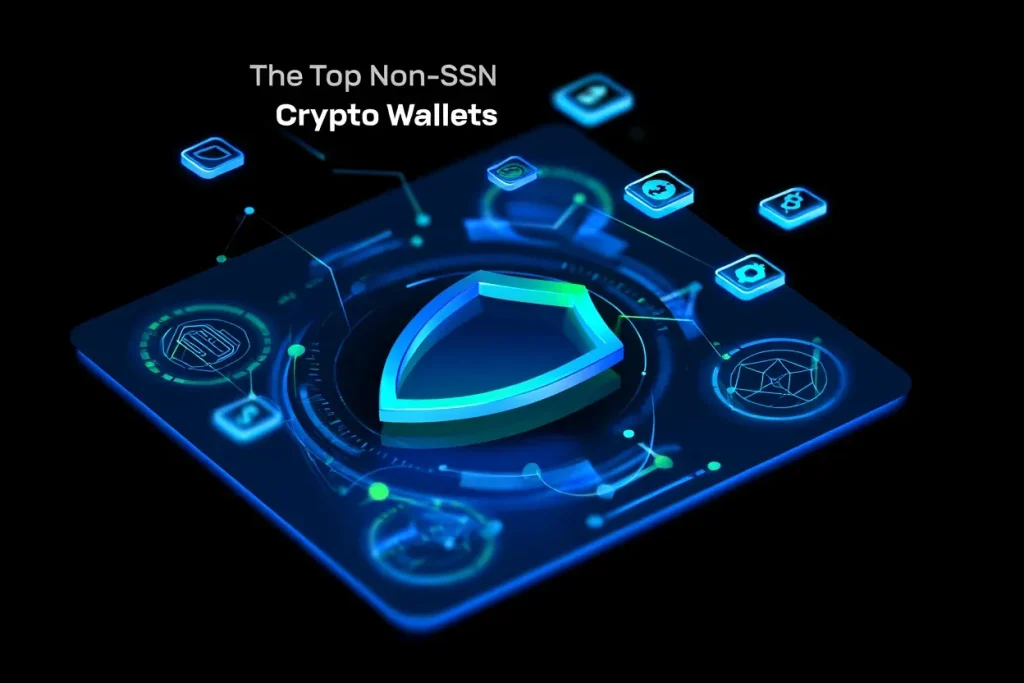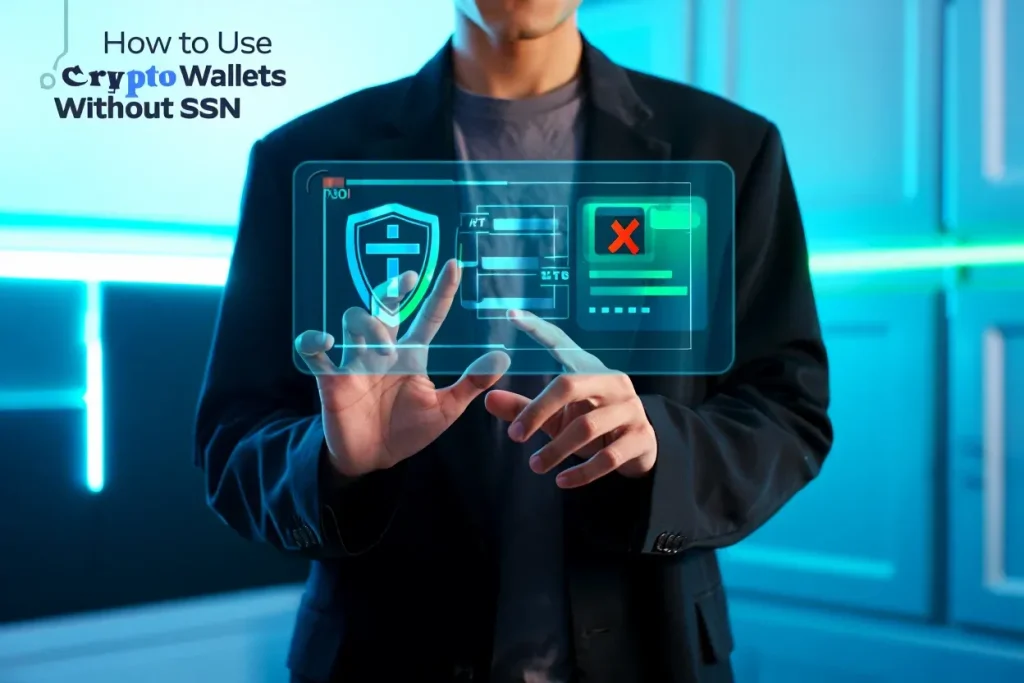Physical Address
304 North Cardinal St.
Dorchester Center, MA 02124
Physical Address
304 North Cardinal St.
Dorchester Center, MA 02124

In 2025, the demand for privacy-first crypto tools is growing rapidly, and one of the hottest topics among users is finding Crypto Wallets That Don’t Require SSN. As global regulations tighten and KYC policies become increasingly invasive, many people worry about exposing their personal data, especially in the U.S., where most platforms require Social Security Numbers (SSN) to get started.
At Webtaichinh, we understand this concern. That’s why we’ve researched and compiled a list of crypto wallets that put your privacy first non SSN required. Whether you’re a privacy enthusiast, a casual user who values anonymity, or simply someone tired of sharing sensitive data, these solutions offer a way to manage your digital assets without unnecessary exposure.
A crypto wallet is a secure digital tool that stores your blockchain assets and credentials (like private keys). Most wallets don’t hold your funds directly—they act as an interface to access your crypto on the blockchain. KYC (Know Your Customer) is the process of verifying a user’s identity, typically involving SSN for US-based users. Non-SSN (KYC-free) wallets let you create and manage crypto addresses without disclosing your SSN or other official ID.

Let’s unpack the types of wallets and how KYC mechanics affect your privacy.
Most centralized crypto platforms especially exchanges are legally obligated to collect SSNs from US users and similar identifiers elsewhere. These rules stem from anti-money laundering (AML) and counter-terrorist financing (CFT) regulations. KYC verifies your real-world identity to link transactions to individuals, crucial for compliance.
Crypto wallet KYC requirements vary. Custodial wallets (where the provider holds your private keys) may also require SSN, especially if they hold user funds or enable exchange-like features. Non-custodial wallets, on the other hand, empower users to generate and control keys locally often with zero KYC. Understanding which wallets are impacted by KYC, and why, helps users find privacy-respecting options.
Comparing wallet types is key to understanding privacy and regulatory exposure:
| Attribute | Custodial Wallet | Non-Custodial Wallet |
|---|---|---|
| Ownership | Provider controls keys | User controls keys |
| Access | Email, password, often KYC/SSN | Seed phrase only; non SSN |
| Privacy | Limited (ID and data tied) | High (minimal/no user data) |
| KYC Requirement | Almost always | Rarely |
| Security | Provider-dependent | User-dependent |
Non-custodial wallets stand out for privacy, rarely ever requiring SSN. This explains why more users seek out non-KYC wallets to stay in control of personal data and assets.
These motivations drive the rapid growth and development of SSN-free wallet technologies. Next, let’s compare the top options side by side.
With privacy and flexibility in mind, below is a feature matrix for leading non-SSN crypto wallets available in 2025. The options span hardware, software, web, and mobile wallets, each providing unique advantages for users who want to control their crypto without SSN or KYC barriers.
| Wallet | Access Type | Supported Coins | Device Compatibility | Privacy Features | Security | Unique Pros/Cons |
|---|---|---|---|---|---|---|
| MetaMask | Non-custodial | ETH, ERC-20, L2 | Browser, mobile | No signup, seed phrase | Password, open-source | Easy DeFi/NFT; not great for Bitcoin |
| Exodus | Non-custodial | 100+ assets | Desktop, mobile | No KYC, local encryption | Backup, 2FA (desktop) | Simple UI; not open-source |
| Trust Wallet | Non-custodial | 70+ blockchains | Mobile, browser | Non SSN, seed only | Biometrics, secure enclave | DEX built-in; limited support for fiat ramps |
| Sparrow | Non-custodial | BTC only | Desktop | Tor, coin control | Multisig, PSBT | Advanced privacy; less beginner-friendly |
| Ledger Nano Series | Hardware | Native multichain | USB, Bluetooth | Offline, no user data | Secure element chip | Very secure; costs $70+ |
| Samourai Wallet | Non-custodial | BTC only | Android | Mixer, Stonewall | PIN, remote erase | Top privacy; Android-only |
| Unstoppable | Non-custodial | BTC, ETH, NFTs | iOS, Android | Open-source, no KYC | Seed/backup, FaceID | DeFi support; new, still growing |
| Electrum | Non-custodial | BTC only | Windows, Mac, Linux | Local keys, Tor | Multisig, cold storage | Veteran software; complex UI |
Armed with this overview, let’s dive deeper into how these wallets work and which might be best for you.

MetaMask has become the default gateway for accessing Ethereum and thousands of decentralized applications (dApps). Launched in 2016 and maintained by ConsenSys, it’s fully non-custodial—meaning only you possess your private keys, which are encrypted and never sent to the server. MetaMask supports Ethereum, ERC-20 tokens, and the latest Layer 2 solutions, with ongoing integration for EVM-compatible networks. Since non SSN or personal ID is required to download or use, newbies can set up a wallet in under a minute by securing a seed phrase locally. Privacy is prioritized, though IP address tracking and browser fingerprinting are possible risks. MetaMask works as a browser extension and mobile app, offering password protection but lacking built-in two-factor authentication. Active community forums, robust help docs, and ongoing support enhance usability.
Exodus is a polished, user-friendly desktop and mobile wallet supporting over 100 cryptocurrencies without ever asking for your SSN or ID. It encrypts your private keys on your device and uses a 12-word recovery phrase for backup. While Exodus isn’t fully open-source, its clean UI, built-in swap capabilities, and responsive customer support have made it a favorite for new and intermediate users alike. Security features include password protection, optional desktop 2FA, and integrated hardware wallet support (Trezor). With no KYC for core wallet functionality, Exodus is accessible worldwide.
Trust Wallet—acquired by Binance in 2018 but operating independently—enables users to store, send, and swap coins on over 70 blockchains with zero KYC. Users generate a local recovery phrase, and all keys remain on-device. Trust Wallet’s privacy-forward model and support for DeFi, NFTs, and in-app DEX trading make it a go-to for non-custodial mobile users. Security includes PIN, biometrics, and secure enclave technologies. Its open-source core has fostered an active global community.
Focused solely on Bitcoin, Sparrow Wallet is a powerful desktop tool for advanced users seeking privacy, multisig, and in-depth coin control. Non SSN or KYC is required—once downloaded, all wallet setup and private keys are generated on your own PC. Features for enhanced privacy include Tor network integration, coinjoin, and non-custodial multisig setups. Its interface is technical but provides granular transparency, ideal for managing larger BTC holdings securely offline. Sparrow is open-source, with strong community development.
Ledger hardware wallets (Nano S, X, and Stax) are physical devices designed for ultimate crypto self-custody. Non SSN or identity checks are needed—wallet initialization, PIN setup, and seed phrase backup happen entirely offline. With support for 5,000+ tokens and seamless integration with popular software wallets, Ledgers suit both beginners and experts. The hardware features a secure chip, making seed phrase extraction virtually impossible. While device loss means loss of funds (unless your seed phrase is backed up), global customer support helps users troubleshoot. Ledger’s robust desktop/mobile apps make day-to-day usage straightforward.
Samourai Wallet addresses BTC privacy head-on with advanced mixing (Whirlpool), stonewall transactions, and robust coin control. Available on Android, it requires non SSN, ID, or even an email for setup. Samourai is open-source, stores keys only on user devices, and has stealth backup features (remote erase). Its focus on maximum privacy can make the interface complex for beginners. The wallet supports Tor integration for network-level anonymity and is beloved by privacy advocates for its philosophy of censorship-resistance.
Unstoppable Wallet is a cross-platform, open-source wallet that delivers total privacy by never asking for SSN, email, or personal info. With support for Bitcoin, Ethereum, stablecoins, Layer 2 tokens, and NFTs, it targets crypto “power users” on both Android and iOS. Security features include FaceID, PIN, and encrypted backups. No KYC is ever required, and the wallet integrates directly with DeFi protocols, allowing on-the-fly swaps and DApps. The project has a vibrant user community and sees steady updates, though it’s newer than some competitors.
Electrum is one of the oldest and most reputable Bitcoin wallets, trusted by pros since 2011. It is completely non-custodial, does not require SSN or KYC, and can be used for single-sig or multisig setups on Windows, Mac, and Linux. Electrum lets users connect via Tor, use hardware wallets, and customize network servers for further privacy. The interface is minimalist but can feel daunting for newcomers. Electrum relies on users to secure and back up their seed phrases, making educational onboarding crucial.
Related reads to deepen your knowledge:

Regulations differ by country; always check local rules to avoid unintentional violations.
Next, let’s examine legal factors and the evolving rules for private crypto usage.
The legality of KYC-free wallets varies globally. In the US, self-custody wallets remain legal, but using them to circumvent regulated exchange KYC could attract scrutiny—especially following the 2024 FATF “crypto travel rule” expansion. The EU has proposed tighter requirements on ‘unhosted wallets,’ but private usage is still broadly allowed for individuals. In parts of Asia (notably China), all non-KYC wallets are heavily restricted, with stiff penalties for local infractions.
In 2023, a major US exchange was fined over $100M for KYC lapses, highlighting increasing enforcement risk even for wallet providers.
Staying compliant is crucial—privacy in wallet choice doesn’t exempt users from tax duties or legal accountability. Regularly review updated IRS or international guidance.

Scammers often impersonate wallet providers or airdrop fake apps to steal login credentials or seed phrases. Avoid clicking links from unverified emails, social media, or ads. Only download wallets from official sources; double-check web addresses. Common scam signals include:
Can I stay completely anonymous using a non-SSN wallet? True anonymity is hard to achieve. While non SSN wallets don’t require ID, blockchain transactions can be traced. Using privacy coins or mixing can increase anonymity, but full privacy may require advanced tools and careful habits.
Are there transaction or withdrawal limits for non-KYC wallets? Typically, non-KYC wallets do not impose on-chain transaction limits. However, using them with third-party services like exchanges or fiat off-ramps may trigger limits or extra checks depending on the provider’s policies.
What if regulations change and KYC becomes mandatory? Self-custody wallets are likely to remain legal in most places, but conversion to/from fiat and using regulated services could get stricter. Always stay informed about local laws to avoid disruption or penalties.
Do I have to pay taxes on crypto stored in non SSN wallets? Yes, regardless of wallet privacy, tax laws require you to declare gains and losses. Non-reporting or hiding activity can lead to legal consequences. Keep detailed records and consult a tax professional if unsure.
What happens if I lose my recovery phrase or device? With non-custodial wallets, losing your recovery phrase usually means total loss of access to assets. No company or “reset” can help—safeguard your recovery info meticulously.
How much crypto can I move without verification? There are no enforced limits on wallet-to-wallet transfers on most blockchains. External services like exchanges or large withdrawals may apply scrutiny, reporting, or require KYC based on region and volume.
Are there risks to holding large amounts in non SSN wallets? Yes—loss, theft, or accidental exposure have irreversible consequences. Regular audit and enhanced security steps (like hardware wallets and multisig) are recommended for significant balances.
The demand for privacy in the crypto world is stronger than ever, and non SSN wallets offer vital solutions for users who value control, flexibility, and autonomy. As regulations shift and blockchain technology matures, understanding the landscape of KYC-free wallets gives you a clear edge in protecting both assets and identity. Always pair privacy with responsible use, secure best practices, and ongoing education. For further insights and the latest financial trends, continue following expert resources and stay proactive about your crypto security strategy.
At Webtaichinh, our mission is to provide you with clear, unbiased insights into the world of cryptocurrency through the Cryptocurrency category, helping you navigate complex topics with confidence, without hype or hidden agendas.
Webtaichinh delivers real-time financial updates, ensuring you stay informed about market trends, policies, and global economic developments. As part of our commitment to excellence, we provide accurate information and in-depth analysis, empowering investors to make swift, confident decisions in a dynamic financial world.
For inquiries or personalized assistance, feel free to contact us:
📞 Phone: 055 937 9204
📧 Email: webtaichinh@gmail.com
💻 Website: https://webtaichinh.vn/
📍 Address: 13 Ho Tung Mau, An Binh, Di An, Binh Duong
At webtaichinh, your financial success is our mission.